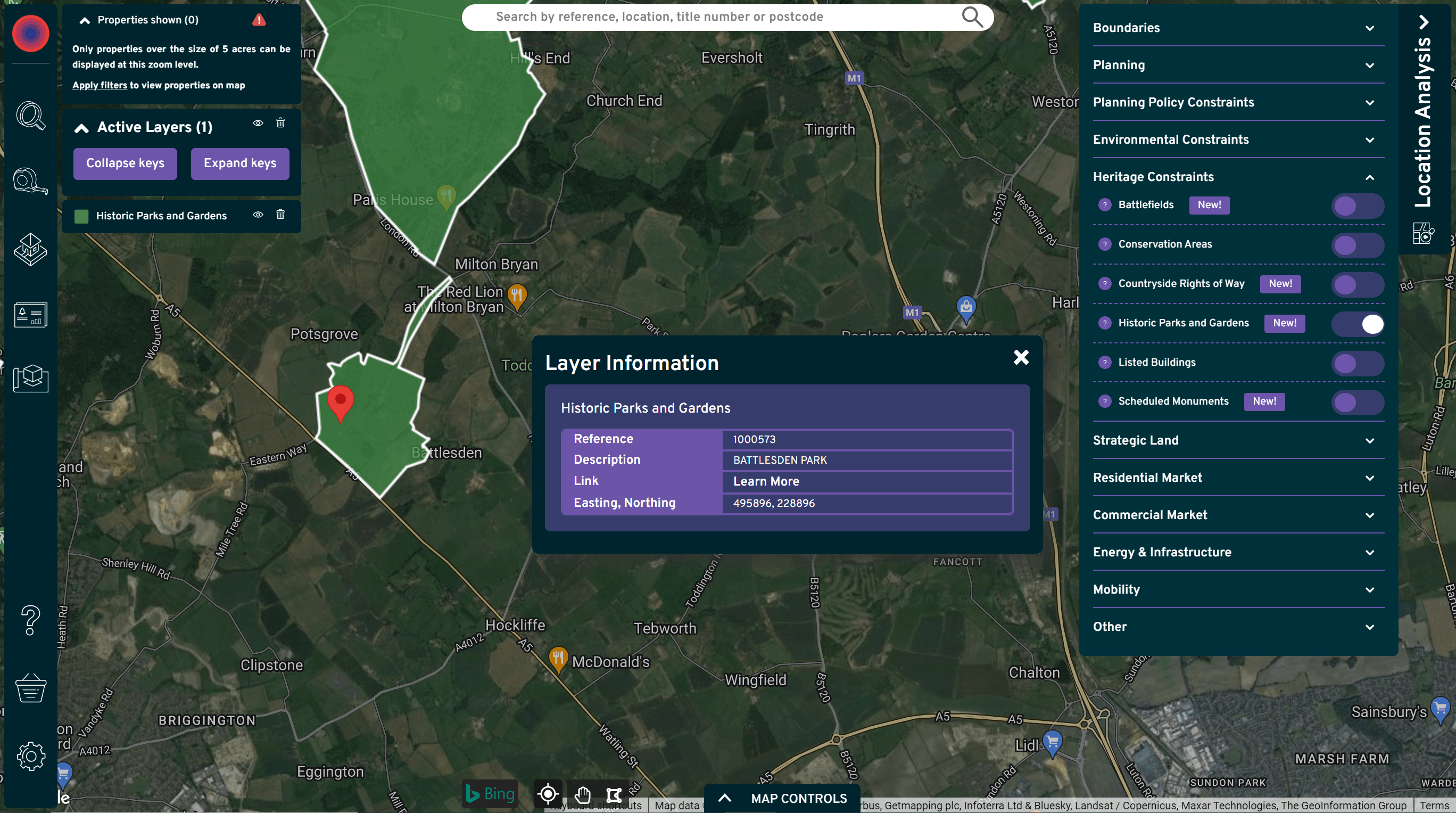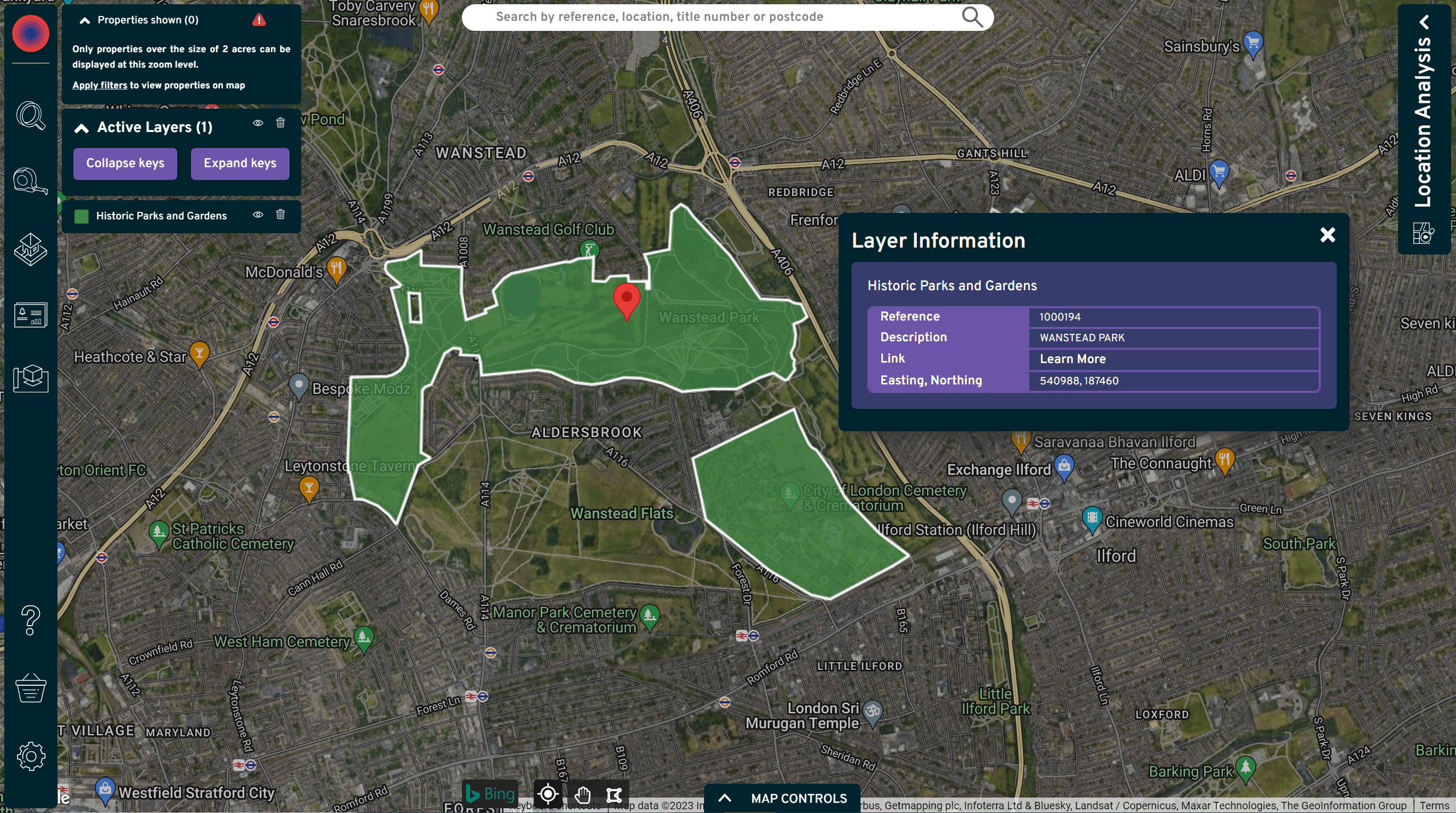We’re delighted to announce another exciting product update to our Heritage Constraints layer: historic parks and gardens. This latest feature is an invaluable tool for residential and commercial developers who wish to honour the past while building for a successful future
The significance of historic parks and gardens:
When considering a site for development, it's not just about the bricks and mortar; it's also about the cultural and historical significance of the land you're working with. Registered historic parks and gardens hold a special place in our heritage, and they are essential elements of our historical landscape.
Why are these parks and gardens significant? The answer lies in the concept of "material consideration" in the planning process. Properties adjacent to or overlapping these protected areas are subject to specific elements of national planning policy. In fact, registered parks and gardens are of the same weight in policy terms under the National Planning Policy Framework (NPPF) as scheduled monuments and listed buildings. In NPPF terms, they are considered "designated heritage assets," with those registered at Grade I or Grade II* being identified as "of the highest significance."

Here's where it gets even more interesting – in England, Local Planning Authorities (LPAs) must consult organisations like Historic England and The Gardens Trust, depending on the grade of registration, when dealing with developments likely to affect these registered sites. Statutory consultation requirements have been in place since 1995 and are still a vital part of the planning process.
Historic parks and gardens in Scotland and Wales also receive similar protections, emphasising the importance of preserving our heritage.
What’s the solution?
Nimbus understands the significance of historic parks and gardens and how they can impact your property development plans. With our new Historic Parks and Gardens layer within the Heritage Constraints section of Location Analysis, we've made it easier for you to explore and understand these protected areas.

Now, when you assess a site for development, you can quickly identify whether it partly or fully overlaps with a registered historic park or garden. This critical insight will enable you to make informed decisions that respect the heritage of the land while also helping you achieve your property goals – all at the touch of a button.
What's next with Nimbus?
At Nimbus, we value your feedback and continuously strive to enhance your experience. These new features empower you to make more informed decisions, streamline your workflow, and reduce complexities in property development.
Our roadmap is packed with exciting innovations, all designed to make your property analysis even more effective and efficient. We can't wait to share these advancements with you in the near future.
Join us for in-depth insights
To dive deep into these new features and explore the full potential of Nimbus, we invite you to participate in our upcoming webinars. These sessions, led by our experts, offer valuable insights and tips to help you master our platform.
Connect with our support team
If you’d like to know more about how Nimbus and our exciting new features can help take your business to the next level, get in touch with our team today at 01926 355 424 or take our new feature for a test drive today when you sign up for a free trial.
Thank you for choosing Nimbus as your partner in property success. We're excited to continue this journey with you, and we can't wait to show you what's next.
Key reads on the Nimbus blog
The revised National Planning Policy Framework places greater weight on delivery, evidence and outcomes. This article looks at what the changes mean in practice for property professionals assessing planning risk, site viability an...
The Renters Rights Act 2025 is set to reshape the private rented sector, introducing the most wide-ranging changes seen for many years. Much of the public discussion has centred on the benefits for tenants, yet the day-to-day impa...
Modest price growth, tighter regulation and more selective development are set to shape the year ahead, with property professionals relying increasingly on detailed data and local insight. 2026 is shaping up to be a year of steady...
Nimbus has launched a new data intelligence platform designed to give property professionals earlier, clearer insight into market activity. The Complete Comparables Tool combines AI-driven detection with a verified national datase...